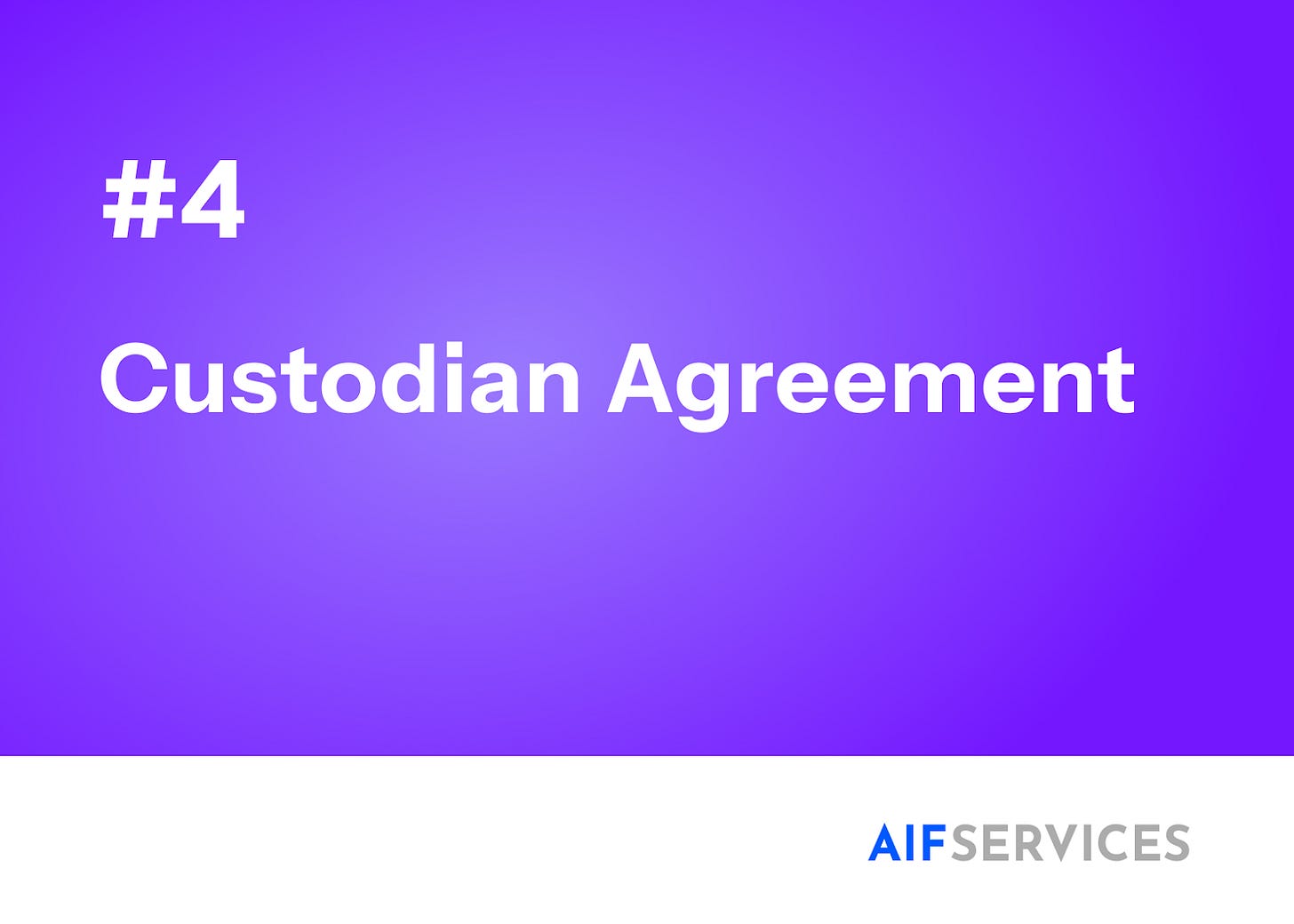Starter Guide To The Custodian Agreement
Custody, Compliance, and Investor Confidence.
In the operational and regulatory framework of Alternative Investment Funds (AIFs), the custodian is a critical institutional counterparty. While the Private Placement Memorandum (PPM) articulates the fund’s strategy and governing documents establish the legal foundation, it is the custodian agreement that provides assurance of investor protection and integrity of asset management.
This article sets out the custodian’s role under SEBI regulations, the key provisions of the custodian agreement, and the compliance timelines introduced under SEBI’s 2024 Master Circular.
Regulatory Mandate for Custodian Appointment
Regulation 20(11) of the SEBI (AIF) Regulations mandates the appointment of a custodian for every AIF scheme. The custodian must be a SEBI-registered entity—typically a bank or a specialized financial institution.
The objective is unambiguous: to achieve segregation of functions between investment management and asset holding. By entrusting securities to an independent custodian, the regulatory framework ensures that investor assets are insulated from misuse, diversion, or operational lapses. This aligns Indian practice with international norms and strengthens institutional investor confidence.
Functional Scope of Custodians
As per Chapter 13, Para 13.2 of the SEBI Master Circular, custodians perform the following essential functions:
Safekeeping of Securities: Maintenance of demat accounts in the name of the AIF scheme.
Settlement of Trades: Verification and execution of receipt and delivery obligations in market transactions.
Record Maintenance: Comprehensive records of holdings and movements of securities.
Corporate Action Processing: Execution of entitlements such as dividends, bonuses, rights, and splits.
Reporting: Periodic reconciliations and statements delivered to the Manager.
For Category III AIFs, custodians have an enhanced role in risk oversight. Under Para 5.2.13, leverage positions must be reported daily to the custodian, who is further obligated to notify SEBI of any breaches in prescribed leverage limits.
Scope Exclusions: Defining Custodian Boundaries
Custodians are not empowered to:
Provide investment advice.
Undertake portfolio management.
Guarantee fund performance.
Audit financial statements.
Their function is supervisory and custodial, not discretionary or advisory.
Core Provisions of the Custodian Agreement
The custodian agreement codifies the responsibilities and standards of the relationship between the AIF and the custodian. Standard provisions include:
Scope of Services: A comprehensive definition of responsibilities.
Standard of Care: Obligation to act with diligence and regulatory compliance.
Fees and Expenses: The structure of compensation.
Limitation of Liability: Boundaries of liability, typically limited to negligence, misconduct, or fraud.
Indemnification: Protection for custodians acting in good faith on instructions of the Manager.
Term and Termination: Duration of engagement and termination procedures.
SEBI’s 2024 Master Circular: Compliance Enhancements
The May 2024 Master Circular strengthens custodian compliance obligations:
Pre-Investment Appointment: No investment activity may commence without a custodian appointment.
Grace Period for Smaller Funds: Category I and II AIFs with corpus ≤ ₹500 crore and holding investments as of January 12, 2024, must appoint a custodian by January 31, 2025.
Associate Custodians: Permissible under Regulation 20(11A), provided independence safeguards are observed. Compliance deadline: January 31, 2025.
Quarterly Reporting: Confirmation of custodian compliance through the SEBI Intermediary Portal.
These measures reinforce SEBI’s policy objective of enhancing transparency, accountability, and systemic risk control in the AIF ecosystem.
Previous post: Starter Guide To The Investment Management Agreement (IMA)
Reference: SEBI Master Circular May 7, 2024
Conclusion
The custodian agreement is a central instrument of governance. It ensures independent verification, segregation, and safekeeping of investor assets—providing both regulatory compliance and market credibility. For first-time sponsors, appointing a recognized custodian signals operational integrity. For established managers, a strong custodian framework mitigates operational and reputational risk.
Disclaimer: This article is for informational purposes only and does not constitute legal or financial advice. It is based on the SEBI Master Circular for AIFs dated May 07, 2024 (SEBI/HO/AFD-1/AFD-1-PoD/P/CIR/2024/39). Regulations are subject to change. Fund managers should seek advice from qualified legal and compliance professionals before taking action.



